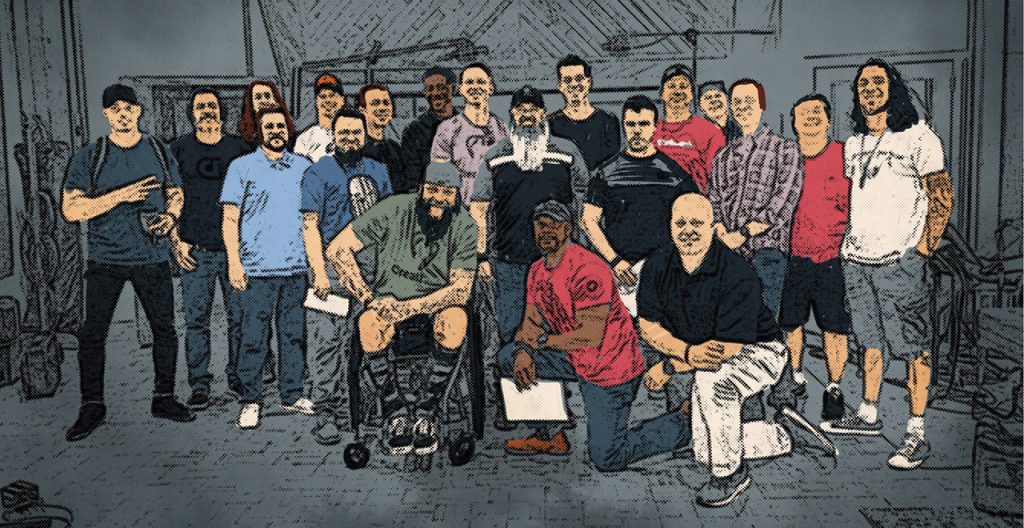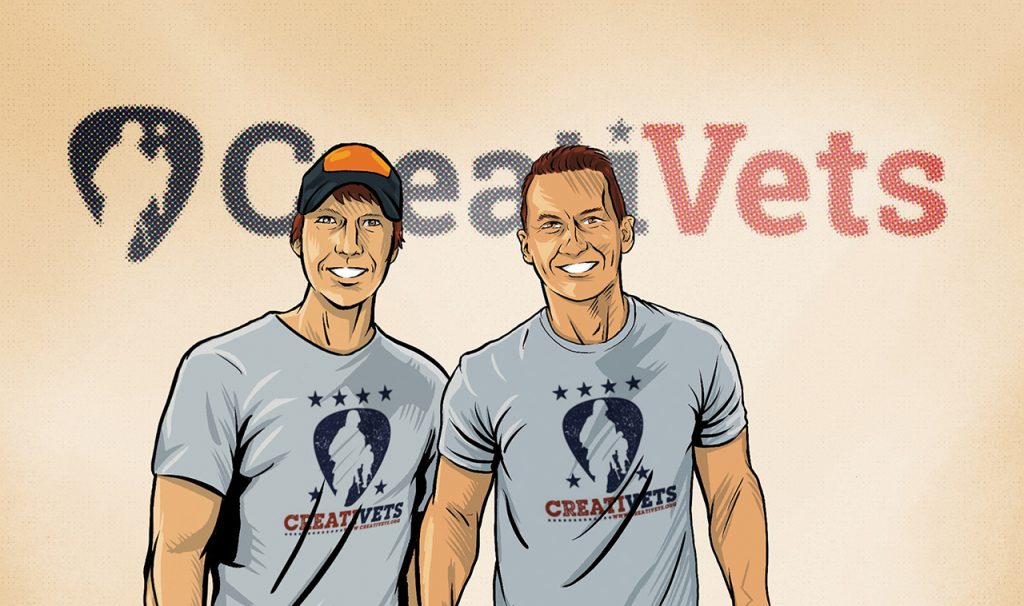Late on a Tuesday night in downtown Bloomington, a man in his mid-20s who seemed to have everything—stability with a well-paying job, his own home, and friends and family close by—paced the city streets.
His ears were ringing from a show at the Lizard Lounge, put on by a local band he knew. The 6-foot-5 former Illinois State basketball player slumped down on a curb across from Fat Jack’s on North Main Street. A breeze brushed across the face of the Java programmer for State Farm Insurance Companies, his employer since high school.
“I was just thinking to myself, ‘Man, it feels like the winds of change are blowing,’” said Brett Gillan ’02, MBA ’08. With the thought of complacency hanging over his head, he pondered pursuing a music career. “You have to start somewhere, and you can’t be afraid to fail,” said Gillan, who changed directions and created the band Brushville that eventually toured the country.
Appears InThat was 13 years ago. Today he uses his musical platform to help veterans suffering from post-traumatic stress disorder (PTSD) as program director of the nonprofit CreatiVets in Nashville. Its mission is to empower wounded veterans to heal from their unseen wounds of war through the arts.
More than 280 people have gone through the songwriting program since its start seven years ago, while 76 others have participated in the conceptual art program. Grants and donations allow for veterans from all over the country to be flown to Nashville, Chicago, Los Angeles, Dallas and other places for music and art programs. They are paired with an artist or songwriter and encouraged to express their darkest memories through art.

It is up to the listener, which is a role Gillan has as a songwriter, to help contextualize their story into an art form that can inspire and motivate healing. The veterans listen to the piece of music the songwriter, producer, and singer have put together.
“The main thing that’s so intriguing about CreatiVets is that we’re always talking about the human condition,” Gillan said. “I’ve always seen it as such a bigger scale and scope. We are really helping people deal with trauma and loss. To be able to deal with those can change everything in life.”
Participants agree. “It’s hard to express in words how I felt after that experience,” said one veteran, “but I know I let go of something deep and feel that this experience is going to allow me to maintain that positive attitude while giving me the courage to live a meaningful life with my children.”
The need for such an outlet is well documented. According to a study by Military Times, veterans account for 29 percent of the suicides in the United States—20 per day, and 14 of those don’t seek help from Veterans Affairs.
Gillan never anticipated becoming part of the healing process. Growing up the son of a school teacher and nurse, he was a stereotypical Midwestern kid. Whenever he needed an escape, basketball was his outlet. He’d pound out on the pavement whatever emotions were eating at his adolescent self. While Michael Jordan was his hero, he connected locally to the Illinois State men’s basketball team. Gillan attended as many games as he could and treasured a ball signed by Redbird players as a prized possession.
As a senior at Normal Community High School, Gillan secured a web designer internship at State Farm. He worked there while studying applied computer science at Illinois State. After his freshman year, he considered being a manager for the Redbirds. His plan changed when he heard of an open tryout for a spot on the roster prior to the 1999-2000 season.
Even with 60 hopeful players competing to suit up for then coach Tom Richardson, Gillan was confident. “I fully believed it. I wouldn’t even tell people I was going to try out next year. I just told them I was going to be on the ISU team,” he said. “It took a lot of visualization, which can really help you in any avenue of life.”
That summer, Gillan swapped late nights with friends for early morning workouts. His efforts were rewarded when he made the team as a walk-on. After hardly fielding any Division III offers out of high school, Gillan accomplished what many didn’t think was feasible.
He held his roster spot four years and was a vital member of the scout team, guarding former Redbird All-American Tarise Bryson ’02 in practice.
Gillan continued working at State Farm when his playing days ended and pursued an MBA at ISU. On the side, he became deeply interested in music. After having played the trumpet in school, he shifted to learning the guitar and later piano.
His passion grew to the point he traveled to Nashville around the age of 24 and joined the Nashville Songwriters Association International. He went to seminars, read books, and networked to gain a greater appreciation for how music unites people.
That’s all the persuasion Gillan needed to take the leap of faith. He finished the MBA before starting solo on his guitar and keyboard playing solo acoustic shows. He then teamed up with a couple of local musicians to create Brushfire, which evolved into Brushville. The group became the house band for Six Strings Club in Bloomington, with Gillan as lead singer.
Gillan befriended club bouncer Richard Casper, a Marine who had nearly been killed four different times by improvised explosive devices in Iraq. He suffered traumatic brain injuries. Gillan learned Casper’s anxiety tied to PTSD. Casper, who was comforted through the friendship, learned guitar and songwriting from Gillan.
“He is just so personable,” Casper said. “Just the way he kind of owned the stage is the same way he built friendships. It seemed like he was very all-in and very upfront. It’s kind of unique in some realms.”

The stage presence was noticed by others as well and in 2010, Brushville caught its big break. The band opened for Lady Antebellum, which had just soared into popularity. Brushville began traversing Illinois from Chicago to Cairo and everywhere in between. Members would finish a show at 2 a.m., hop in a tour bus, grab some gas station food, and repeat. Audiences grew as the band went national.
Brushville won the Battle for the Saddle competition at Nashville’s famous Wildhorse Saloon in 2012. By 2014, the band had started to play its own original songs and had its first record released. It sold 2,000 copies right out of the gate and was No. 1 on the Billboards Heatseeker chart, even getting featured in the famous magazine itself.
Brushville showcased for record deals, but didn’t secure any. In 2016, Gillan once again felt a pull to change directions. Life on the road was exhausting and taking a toll. His voice was strained from playing almost nightly. After nine years with the band, he pondered his next pursuit, which he found through his old friend Casper. He had moved to Nashville in 2013 and co-founded CreatiVets to help veterans who had struggles similar to his own. Casper had gained strength in healing through music that Gillan shared with him years earlier.
”For him to give me the gift of songwriting and guitar, if he didn’t do that, honestly who knows if CreatiVets would even be here,” Casper said, noting he connected with songwriters in the Music City through Gillan.
After leaving the band, Gillan also made Nashville his home. He pursued an independent songwriting career and joined the CreatiVets team, which released an album called “Veterans Songs” on July 3. “I like to think I inspired kids by walking on to the basketball team or playing music in a band and going after those dreams. But those were largely for me,” he said. “I don’t feel like I gave as much back.”
That regret has been replaced with rewarding experiences for Gillan, who is honored to serve those who sacrificed for the country. He is pleased that his path from the ISU campus to Nashville has impacted so many.
“With Brett, I can say with 100 percent certainty that CreatiVets wouldn’t be where it is if it weren’t for him,” Casper said. “Every veteran we’ve helped is a direct result of something he’s helped create.”
Gillan has found contentment and purpose by helping veterans gain inner peace. He reflects on his journey with gratitude that he never allowed obstacles or others to dictate his direction forward. He advises others to find the same courage.
“Go all out for what you want in life,” Gillan said. “Be resilient, not flawless. Don’t go for perfection. Just go for consistently doing what you love.”

